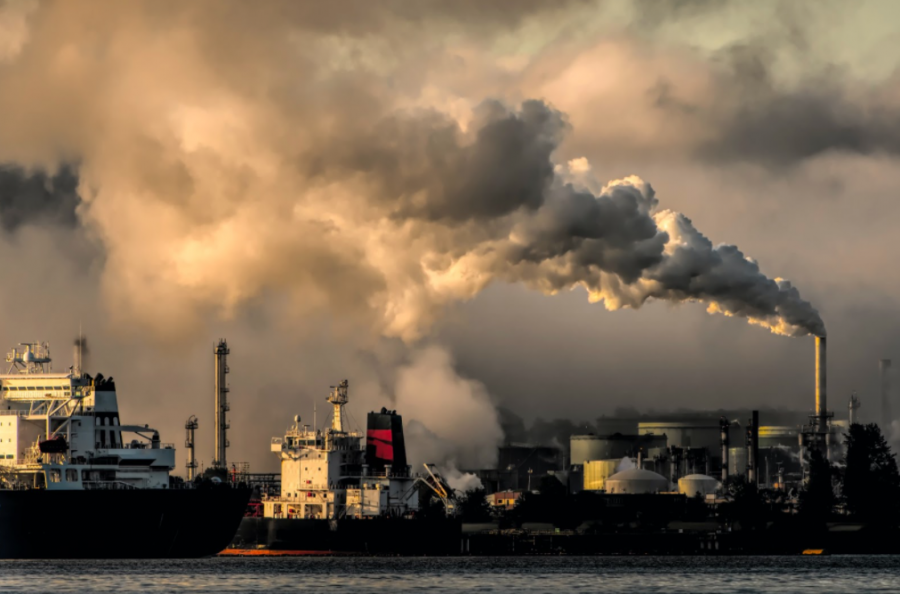UHS Students’ Response to the UN IPCC Climate Change Report
A picture of exhaust gas exiting factory pipes (non-copyrighted image)
October 29, 2021
The world right now is a living dystopia. Swirling vortexes reign the east coast, uprooting thousands of families- meanwhile, the west persists through an undying drought and triple-digit, flounder-inducing heat waves. The impacts of climate change have never been more markedly felt than the past summer, nor have they been more undoubtedly linked to human impact, as the recent Intergovernmental Panel on Climate Change (IPCC) report from the United Nations has affirmed.
The IPCC, an international body, led by the United Nations, issues a climate change report every six to seven years. The August 2021 fifth assessment report is a ‘code red for humanity,’ concluding that human greenhouse gas emissions are ‘unequivocally’ the root cause of global warming. Additionally, we have warmed the earth at an astonishing 1.2 degrees Celsius, essentially locking in the next 30 years of continual warming.
However, it is widely acknowledged that this is not a new phenomenon. Even intent observers of the climate situation at UHS share this sentiment.
“I was not very surprised to read about the drastic climate change situation,” Junior Haley Hsu, Vice President of Eco Club, said. “I think it is common knowledge that we have been worsening climate change… but many people choose to ignore it.”
This awareness of the inevitable future of the climate can lead to a heightened sense of anxiety towards the end, a phenomenon classed as ‘climate anxiety.’
“I worry about the future of our planet in my generation and generations proceeding us,” Sophomore Elizabeth Choi said. “And I reflect to myself how ignorant I, and many of my peers, have been in regards to climate change and the real dangers our planet is facing.”
Many students involved in Uni’s Eco Club share this paralyzing feeling but stress the importance of moving forward.
“We should also be actively participating to stop climate change,” said Hsu. “Whether that be signing petitions, donating to organizations, or being a part of groups like Eco Club.”
As high school students, part of Generation Z, students feel an inherently different responsibility towards climate change than previous generations. Generation Z is often commended for their unparalleled dedication to the climate crisis, as they will realize the issues that have been looming for decades.
“I feel that it’s our responsibility to pull together and stop procrastinating climate change solutions,” Junior Ruby Seckinger said. “I’m optimistic and hopeful that Gen Z is truly going to make a change, especially when more of us become of voting age.”
So what change can a high school student contribute, and how much does the planet’s future rely on Gen Z? On an individual level, there are conscious decisions to be made in every facet of life to better the environment.
“I stopped eating red meat, I think in October of 2020, and I’m a part of Eco Club,” junior Elise Feuerborn said. “I try my best to use my metal straws and reusable bags, and I get most of my favorite clothes from thrifting.”
Other students combat this issue by reducing their energy consumption.
“I try to conserve energy as much as possible–turning off lights… taking shorter showers… biking or scootering instead of driving when going to nearby locations,” Hsu said.
Nevertheless, it is crucial to realize that the more significant problem isn’t solved with swaps for wasteful products and the occasional vegan choice. Eco-friendly alternatives seem to provide simple solutions without accounting for the rest of the world’s population, across classes and races.
“The climate crisis is a result of megacorporations polluting the earth and atmosphere, and refusing to be held accountable or make sustainable changes,” Seckinger stated. “While making small lifestyle changes is important, it’s even more important that we use our voices to hold megacorporations and world leaders accountable.”
And it indeed is a product of the cumulative efforts of the economic powerhouses of the country. These multi-million dollar companies that sit guarded from the reach of an individual, pump out exhaust that accounts for 23% of all US greenhouse gas emissions, according to a 2019 assessment. Electricity and transportation make up 25% and 29% of the 5.3 million tons respectively.
It’s easy to feel powerless against the carefully maintained bureaucracies and institutions that seem to remain persistently stagnant on the subject of climate change. To overcome such a multilayered predicament, many students urge others to take the initiative to learn more about the climate situation.
“Action starts with awareness of an issue,” Seckinger said. “So I think that the best thing high school students can do is educate themselves and others about the climate so that they are more receptive to making impactful changes.”





